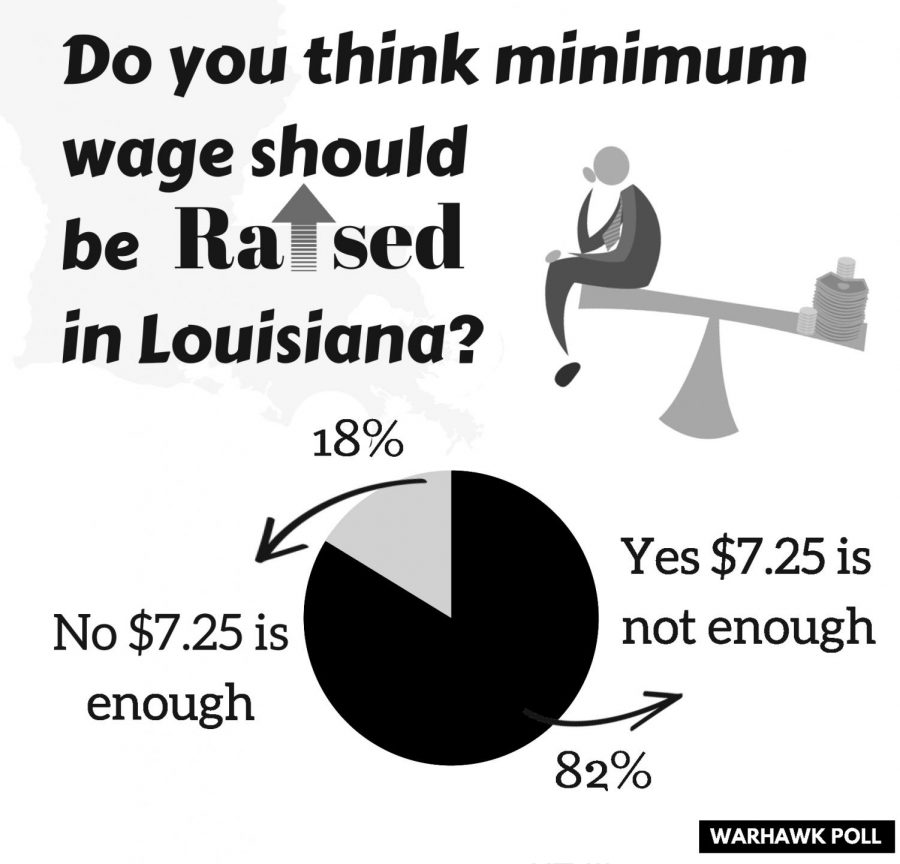Opinion: Raise the minimum wage already
The first federal minimum wage of 25 cents an hour was introduced in 1938 during the Great Depression by former president Franklin Roosevelt.
Since then, it has changed a total of 22 times. In 2008, we saw the last raise of $6.55 to $7.25.
29 states, plus the District of Columbia, have raised the minimum wage higher than the suggested federal wage, which hasn’t gone up from $7.25 in almost ten years. For instance, California pays $13.50 per hour for minimum wage jobs.
Most states decide what the minimum wage should be based off of the consumer price index that is influenced by inflation.
In other words, states with better economies are more likely to raise the minimum wage.
And, unless we have a change nationwide, it is very unlikely that we will see a raise in the minimum wage for Louisiana.
Personally, I have never been able to work and keep a minimum wage job.
After my first paycheck as a host, I looked into waiting tables, where I would receive tips, and other commission based jobs. Because minimum wage is only $7.25, I have actually turned down several jobs offers.
Even in high school, the $200 checks I received bi-weekly was never enough for everything I needed.
Minimum wage jobs require minimum skills. The average full-time worker at a minimum wage paying job makes $15,080 yearly.
These jobs, like a cashier or fast food chains, are seen as occupations for teenagers and students. They may need money for gas, movie tickets or just extra cash.
These jobs aren’t meant to support your entire family and pay all of your bills. They are just jobs to help a kid get by.
Yet, we have people who choose to settle with these jobs instead of pursuing a real career or a trade.
Every day, we have people going the extra mile to go to universities and technical college with promises of degrees to ensure a good job that can support them.
The cost of living has increased a lot since way back when.
Now, your dollar doesn’t stretch like it used to, because things you need are more expensive.
If we raised the minimum wage from $7.25 to $8.25 it wouldn’t be a drastic change in the budget. By raising the wage just a little it can help your dollar last a little longer.
A dollar raise may not seem like a lot, but it could give motivation to the unemployed citizen.
This would help increase economic activity, stimulate job growth and reduce the government welfare spending.
By increasing the minimum wage the percentage would roll over to those who already make above minimum wage.
From a small survey done in 2014, 53 percent of small business owners believe that with increased wages business would have an employment turnover.
Increased productivity and motivation from workers could also lead to higher customer satisfaction.
The current minimum wage is barely enough to afford everyday essentials and prevents many from having independent housing.
By raising this wage it could help decrease crime and school dropouts while furthering education. More money being made could be one less stress factor.
Increasing the wage can reduce poverty and create pay equality between genders in the work force. The economy does better when people are working. This is common sense.
The decline in the value of wage is one of the many reasons wage inequality exists.
A majority of Americans believe that increasing the minimum wage could eliminate these factors.




